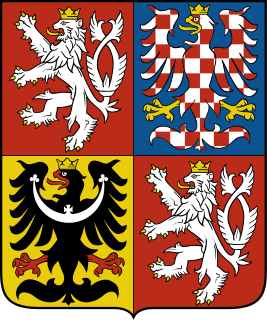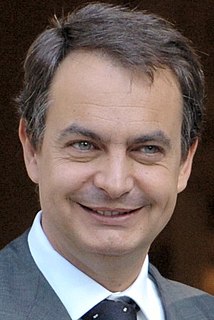Related Research Articles

There are four types of elections in Spain: general elections, elections to the legislatures of the autonomous communities, local elections and elections to the European Parliament. General elections and elections to the legislatures of the autonomous communities are called after the mandate of the national or regional legislature expires, usually four years after the last election, although early elections may occur. Elections to local councils and to the European Parliament are held on fixed dates but some local government bodies are not directly elected. For most elections party list PR is used, but the plurality system is used for the Senate.

All elections in the Czech Republic are based on the principle of universal suffrage. Any adult citizen who is at least 18 years old can vote, except those who have been stripped of their legal capacities by a court, usually on the basis of mental illness. Elected representatives are elected directly by the citizens without any intermediaries. Election laws are not part of the constitution, but – unlike regular laws – they cannot be changed without the consensus of both houses of the Parliament. The Czech Republic uses a two-round plurality voting system for the Presidential and Senate elections and an open party-list proportional representation system for all other elections. The proportional representation system uses the D'Hondt method for allocating seats.
Elections in Hungary are held at two levels: general elections to elect the members of the National Assembly and local elections to elect local authorities. European Parliament elections are also held every 5 years.

Elections in San Marino gives information on election and election results in San Marino.

Chiesanuova is a minor municipality of San Marino. It has a population of 1,143 inhabitants in an area of 5.46 km2.

The 2007 Spanish local elections were held on Sunday, 27 May 2007, to elect all 66,131 councillors in the 8,111 municipalities of Spain and all 1,038 seats in 38 provincial deputations. The elections were held simultaneously with regional elections in thirteen autonomous communities, as well as local elections in the three foral deputations of the Basque Country and the eleven island councils in the Balearic and Canary Islands.

General elections were held in San Marino on 10 June 1906.

The 1995 Spanish local elections were held on Sunday, 28 May 1995, to elect all 65,869 councillors in the 8,067 municipalities of Spain and all 1,034 seats in 38 provincial deputations. The elections were held simultaneously with regional elections in thirteen autonomous communities, as well as local elections in the three foral deputations of the Basque Country and the ten island councils in the Balearic and Canary Islands.

The 1999 Spanish local elections were held on Sunday, 13 June 1999, to elect all 65,201 councillors in the 8,104 municipalities of Spain and all 1,034 seats in 38 provincial deputations. The elections were held simultaneously with regional elections in thirteen autonomous communities, as well as local elections in the three foral deputations of the Basque Country, the ten island councils in the Balearic and Canary Islands and the 1999 European Parliament election.

The 2003 Spanish local elections were held on Sunday, 25 May 2003, to elect all 65,510 councillors in the 8,108 municipalities of Spain and all 1,036 seats in 38 provincial deputations. The elections were held simultaneously with regional elections in thirteen autonomous communities, as well as local elections in the three foral deputations of the Basque Country and the ten island councils in the Balearic and Canary Islands.
The 2014 San Marino local elections were held on 30 November to elect the mayors and the councils of the 9 municipalities of San Marino. Overall turnout was 44.9%.
The 2009 San Marino local elections were held on 7 June to elect the mayors and the councils of the nine municipalities of San Marino. Overall turnout was 55.1%. The election in the City of San Marino was declared invalid, as it didn't reach the turnout quorum. Therefore, a second election was held on 29 November.
The 2004 San Marino local elections were held on 18 April to elect the mayor and the council of the municipalities of Borgo Maggiore, in San Marino, as the 2003 Sammarinese local elections was declared invalid, as the turnout quorum was not reached. Turnout in this election was 61.5%.
The 2003 San Marino local elections were held on 30 November to elect the mayors and the councils of the nine municipalities of San Marino. Overall turnout was 55.4%. The election in Borgo Maggiore was declared invalid, as the turnout quorum was not reached. Therefore, a second election was held on 18 April 2004.
The 1998 San Marino local elections were held on 13 December to elect the mayors and the councils of Acquaviva, Borgo Maggiore, Faetano, Fiorentino and Serravalle in San Marino. Overall turnout was 64.0%.
The 1997 San Marino local elections were held on 14 December to elect the mayor and the council of Montegiardino in San Marino. Turnout was 81.8%.
Maria Teresa Beccari was a Sammarinese politician, Mayor of the City of San Marino between 13 December 2009 and 31 October 2018.
Lucia Tamagnini is a Sammarinese politician, Mayor of Acquaviva since 20 March 2013, when Loretta Mazza resigned.
The 2020 San Marino local elections were held on 29 November, to elect the mayors and the councils of the 9 municipalities of San Marino. These elections were initially scheduled to take place on 15 December 2019, but were postponed to 21 June 2020 due to a snap general election called for 8 December. Due to the COVID-19 pandemic, elections were postponed once again to 29 November 2020.

The 2023 Spanish local elections will be held on Sunday, 28 May 2023, to elect all councillors in the municipalities of Spain and all 1,038 seats in 38 provincial deputations. The elections will be held simultaneously with regional elections in at least seven autonomous communities, as well as local elections in the three foral deputations of the Basque Country, the eleven island councils in the Balearic and Canary Islands.